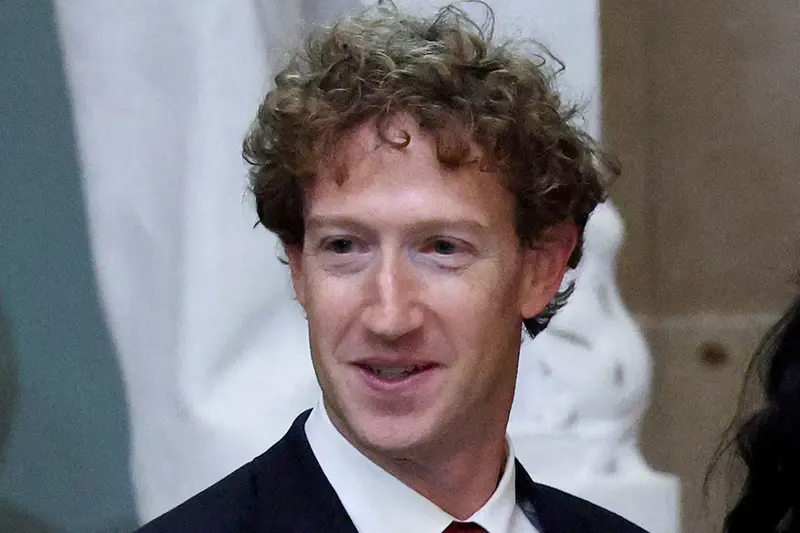By Tom Hals
July 16, 2025 – 8:02 AM PDT

WILMINGTON, Delaware (Reuters) – An $8 billion trial by Meta Platforms (META.O) shareholders against Mark Zuckerberg and other current and former company leaders kicked off on Wednesday over claims they illegally harvested the data of Facebook users in violation of a 2012 agreement with the U.S. Federal Trade Commission.
The trial started with a privacy expert for the plaintiffs, Neil Richards of Washington University Law School, who testified about Facebook’s data policies.
“Facebook’s privacy disclosures were misleading,” he told the court.
Jeffrey Zients, White House chief of staff under President Joe Biden and a Meta (META.O) director for two years starting in May 2018, is expected to take the stand later on Wednesday in the non-jury trial before Kathaleen McCormick, chief judge of the Delaware Chancery Court.
The case will feature testimony from Zuckerberg and other billionaire defendants including former Chief Operating Officer Sheryl Sandberg, venture capitalist and board member Marc Andreessen as well as former board members Peter Thiel, Palantir Technologies (PLTR.O) co-founder, and Reed Hastings, co-founder of Netflix (NFLX.O).
A lawyer for the defendants, who have denied the allegations, declined to comment.
McCormick, the judge who rescindedElon Musk’s $56 billion Tesla pay package last year, is expected to rule on liability and damages months after the trial concludes.
The case began in 2018, following revelations that data from millions of Facebook users was accessed by Cambridge Analytica, a now-defunct political consulting firm that worked for Donald Trump’s successful U.S. presidential campaign in 2016.
The FTC fined Facebook $5 billion in the wake of the Cambridge Analytica scandal, saying the company had violated a 2012 agreement with the FTC to protect user data.
Shareholders want the defendants to reimburse Meta for the FTC fine and other legal costs, which the plaintiffs estimate total more than $8 billion.
In court filings, the defendants described the allegations as “extreme” and said the evidence at trial will show Facebook hired an outside consulting firm to ensure compliance with the FTC agreement and that Facebook was a victim of Cambridge Analytica’s deceit.
Meta, which is not a defendant, declined to comment. On its website, the company has said it has invested billions of dollars into protecting user privacy since 2019.
The lawsuit is considered the first of its kind to go to trial that alleges that board members consciously failed to oversee their company. Known as a Caremark claim, such lawsuits are often described as the hardest to prove in Delaware corporate law. However, in recent years, Delaware courts have allowed a growing number of these claims to proceed.
Boeing’s current and former board members settled a case with similar claims in 2021 for $237.5 million, the largest ever in an alleged breach of oversight lawsuit. The Boeing directors did not admit to wrongdoing.
The Meta trial comes four months after Delaware lawmakers overhauled the state’s corporate law to make it harder for shareholders to challenge deals struck with controlling shareholders like Zuckerberg. The bill, which did not address Caremark claims, was drafted after the state’s governor met with representatives of Meta.
Most publicly traded companies are incorporated in the state, which generates more than a quarter of the state’s budget revenue. Meta, which was reportedly considering leaving Delaware earlier this year, is still incorporated in the state.
Andreessen Horowitz, the venture capital fund co-founded by Andreessen, said earlier this month that it was reincorporating in Nevada from Delaware and encouraged other companies to do the same. The company cited the uncertainty of the state’s courts and referenced the Musk pay ruling.
Andreessen is expected to testify on Thursday.
In addition to privacy claims at the heart of the Meta case, plaintiffs allege that Zuckerberg anticipated that the Cambridge Analytica scandal would send the company’s stock lower and sold his Facebook shares as a result, pocketing at least $1 billion.
Defendants said evidence will show that Zuckerberg did not trade on inside information and that he used a stock-trading plan that removes his control over sales and is designed to guard against insider trading.
Reporting by Tom Hals in Wilmington, Delaware; Editing by Noeleen Walder, David Gregorio and Mark Porter
What do YOU think? Click here to jump to the comments!
Sponsored Content Below

